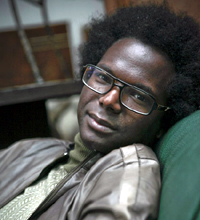I was born in 1954, the
year that the Supreme Court made segregation illegal in schools.
I grew up with hastily effaced signs in front of my eyes, signs
that used to read “Whites”, “Blacks”
“Colored”, “White Women”, “Black
Women”. All these names make the history of my race. Nigger,
Man of color, Black American, Afro-American. I was born in a
country where my place was never mine, where everything was
taken away from me, my name, my history, down to the colour
of my skin. My name is Carter. I had to adapt myself to this
name that was given to me. Nothing is given in America, everything
has to be taken. The way you looked when these people told you
their stories. In every black American family there is a crime
committed by white Americans. We endured for such a long time.
Everything is forgotten, especially the fear, the pain, the
grief… But some do remember, or rather, they are made
to remember. Norton was sacrificed on the altar of our collective
history.
Norton wanted to make
up for our history. This is how I explain his gesture, and his
madness, it did not start yesterday. There is no use Jennings
saying that young Norton was out of his mind. He is mistaken.
I am filled with anger. Anger against our country. We the Afro-Americans,
we are on our way to extinguish ourselves, we are not accepting
ourselves.
How many generations does it take to be in peace with ourselves?
We are like those isolated soldiers, who did not hear about
the armistice and who go on with the war. From time to time
this defiance is justified, especially in a society which today
has more subtle ways of still keeping you in a subaltern position.
But we are also the actors of this society. Nothing is given
in America, everything has to be taken.
You don’t know
what it is like to live in America when you are a Black American.
The story of Clarence Brown, for people who do not know America,
is detestable. For Americans, it is current affairs.
Translated from the French by Jarmo Pikkujamsa












![]()
![]()

